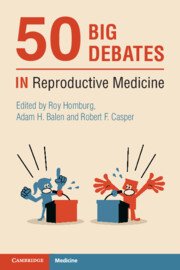Book contents
- 50 Big Debates in Reproductive Medicine
- Series page
- 50 Big Debates in Reproductive Medicine
- Copyright page
- Contents
- Contributors
- Foreword
- Introduction
- Section I Limits for IVF
- Section II IVF Add-ons
- Section III The Best Policy
- Section IV Embryology
- Section V Ethics and Statistics
- 30A Sex Selection Should Be Permitted for Family Balancing
- 30B Sex Selection Should Be Permitted for Family Balancing
- 31A Reproductive Medicine Should Be Publicly Funded
- 31B Reproductive Medicine Should Be Publicly Funded
- 32A Gamete Donation Should Be Anonymous
- 32B Gamete Donation Should Be Anonymous
- 33A Uterus Transplantation Is a Step Too Far
- 33B Uterus Transplantation Is a Step Too Far
- 34A Meta-analysis Should Not Be Considered Class A Evidence
- 34B Meta-analysis Should Not Be Considered Class A Evidence
- Section VI Male-factor Infertility
- Section VII Genetics
- Section VIII Ovarian Stimulation
- Section IX Hormones and the Environment
- Index
- References
31A - Reproductive Medicine Should Be Publicly Funded
For
from Section V - Ethics and Statistics
Published online by Cambridge University Press: 25 November 2021
- 50 Big Debates in Reproductive Medicine
- Series page
- 50 Big Debates in Reproductive Medicine
- Copyright page
- Contents
- Contributors
- Foreword
- Introduction
- Section I Limits for IVF
- Section II IVF Add-ons
- Section III The Best Policy
- Section IV Embryology
- Section V Ethics and Statistics
- 30A Sex Selection Should Be Permitted for Family Balancing
- 30B Sex Selection Should Be Permitted for Family Balancing
- 31A Reproductive Medicine Should Be Publicly Funded
- 31B Reproductive Medicine Should Be Publicly Funded
- 32A Gamete Donation Should Be Anonymous
- 32B Gamete Donation Should Be Anonymous
- 33A Uterus Transplantation Is a Step Too Far
- 33B Uterus Transplantation Is a Step Too Far
- 34A Meta-analysis Should Not Be Considered Class A Evidence
- 34B Meta-analysis Should Not Be Considered Class A Evidence
- Section VI Male-factor Infertility
- Section VII Genetics
- Section VIII Ovarian Stimulation
- Section IX Hormones and the Environment
- Index
- References
Summary
I have argued ever since the April Fool’s Day declaration in 1994 that took away public funding of in vitro fertilisation (IVF) in Canada that all women in Canada should have equal access to reproductive medicine [1,2]. I have argued ever since the April Fool’s Day declaration in 1994, no woman in Canada should have to undergo suboptimal and risky medical strategies in order to have IVF or related technologies to achieve having a child [1,2]. These suboptimal and risky strategies include having to sell half their oocytes in exchange (or barter) for access to an IVF cycle [1,2]. What I mean when I refer to having access to appropriate reproductive medicine, including IVF and related technologies, is that all women in Canada with appropriate indications should be able to have multiple publicly funded IVF cycles if they so wish, rather than women in Canada being confined to having only one cycle in some provinces, and only if the woman has blocked (rather than otherwise incapacitated) fallopian tubes as demonstrated by imaging techniques [1]. There are scientifically proven medical indications for IVF and related technologies other than damaged fallopian tubes [2].
- Type
- Chapter
- Information
- 50 Big Debates in Reproductive Medicine , pp. 160 - 162Publisher: Cambridge University PressPrint publication year: 2021



